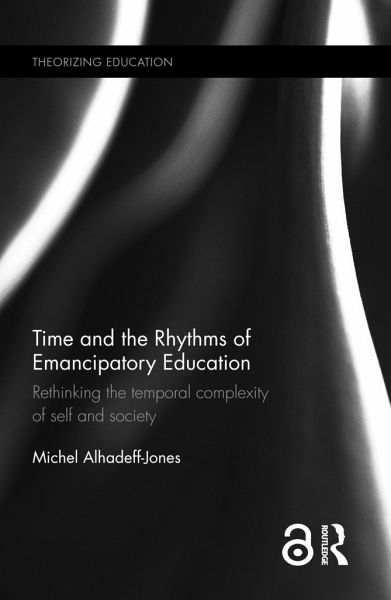Michel Alhadeff-Jones
Gebundenes Buch
Time and the Rhythms of Emancipatory Education
Rethinking the temporal complexity of self and society
Versandkostenfrei!
Versandfertig in 1-2 Wochen
Weitere Ausgaben:

PAYBACK Punkte
100 °P sammeln!





This book argues that by rethinking the way we relate to time, we can fundamentally rethink the way we conceive education. It provides an epistemological, historical and theoretical framework that will serve as a comprehensive resource for critical reflection on the relationship between the experience of time and emancipatory education.
Michel Alhadeff-Jones is a psychosociologist and a philosopher of education. He works as an adjunct associate professor in the Adult Learning and Leadership Program at Teachers College, Columbia University. In Europe, he teaches at the universities of Fribourg and Geneva (Switzerland) and he is associated to the French Laboratory of Research EXPERICE (Experience, Cultural Resources and Education) at the University of Paris. He is the founder of the Sunkhronos Institute located in Geneva.
Produktdetails
- Verlag: Routledge
- Seitenzahl: 240
- Erscheinungstermin: 2. November 2016
- Englisch
- Abmessung: 240mm x 161mm x 18mm
- Gewicht: 529g
- ISBN-13: 9781138845848
- ISBN-10: 1138845841
- Artikelnr.: 43675114
Herstellerkennzeichnung
Libri GmbH
Europaallee 1
36244 Bad Hersfeld
gpsr@libri.de
'A probing exploration of the temporal dimensions of education. This book is an intellectual masterpiece that will set the standard for a long time to come.'
Gert Biesta, Brunel University London, UK
'Questioning common assumptions regarding temporal rhythms is inherently transgressive. In this fascinating and groundbreaking theoretical analysis, Michel Alhadeff-Jones explores the intersection of temporal rhythms, learning processes and the dynamics of emancipatory education.'
Stephen Brookfield, University of St. Thomas, USA
'Unlike the scientist who quests for the instant of understanding, the educator has to make an ally of the full stretch of time. He or she needs to develop an appreciation of time's
Gert Biesta, Brunel University London, UK
'Questioning common assumptions regarding temporal rhythms is inherently transgressive. In this fascinating and groundbreaking theoretical analysis, Michel Alhadeff-Jones explores the intersection of temporal rhythms, learning processes and the dynamics of emancipatory education.'
Stephen Brookfield, University of St. Thomas, USA
'Unlike the scientist who quests for the instant of understanding, the educator has to make an ally of the full stretch of time. He or she needs to develop an appreciation of time's
Mehr anzeigen
heterogeneous and contradictory nature rather than seeing it simply as the foe of speed and efficiency. Michel Alhadeff-Jones's study constitutes the richest examination of educational temporality I have ever encountered. It is immensely learned, assembling and responding to a body of literature that crosses multiple scholarly fields; it is penetratingly insightful, particularly in the way it explains how emancipation is, literally, a matter of rhythm; and it is utterly original. Educational theorists will find ample food for thought and debate in this book and educators, a groundbreaking way of reconceiving of their practice.'
Rene V. Arcilla, New York University Steinhardt School of Culture, Education, and Human Development, USA
'This deeply thoughtful book merits our attention so as to appreciate time's complexity, the subtlety of the analysis and its emancipatory intent. We often experience time as tyranny, at work, in classrooms, in families or as a general aspect of 'hyper-modernity'. Time may never seem our own. But there are routes to emancipation by taking time out to recognize tyrannies and how to transgress them. This compelling book combines interdisciplinary understanding with biographical sensibility to consider temporal constraints and resistance to them. So take time to read it and consider time's biological, psychological, cultural and emancipatory rhythms. Giving time to the book will in fact be a good, transgressive act in its own right!'
Linden West, Canterbury Christ Church University, UK
'A very rich narrative on how diverse experiences of time structure our educational and learning experiences and vice-versa. Drawing on both continental and Anglo-American multidisciplinary sources, Michel Alhadeff-Jones constructs a framework that enables researchers and practitioners to explore new ways of considering how 'life rhythms' and institutional practices of work and learning often contradict each other, yet, how these conflicts can also be the source of emancipatory trajectories of both individuals and collectivities. A groundbreaking work that takes the reader step by step on an inspiring journey, from reductionist approaches to complexity-inspired views on human learning and education, whilst transgressing the boundaries between diverse practices such as formal and non-formal education, social work, vocational education and training and human resource development. The work opens new perspectives on how to conceive of emancipation in connection with the rhythms of life of individuals, institutions and societies.'
Danny Wildemeersch, University of Leuven, Belgium
Rene V. Arcilla, New York University Steinhardt School of Culture, Education, and Human Development, USA
'This deeply thoughtful book merits our attention so as to appreciate time's complexity, the subtlety of the analysis and its emancipatory intent. We often experience time as tyranny, at work, in classrooms, in families or as a general aspect of 'hyper-modernity'. Time may never seem our own. But there are routes to emancipation by taking time out to recognize tyrannies and how to transgress them. This compelling book combines interdisciplinary understanding with biographical sensibility to consider temporal constraints and resistance to them. So take time to read it and consider time's biological, psychological, cultural and emancipatory rhythms. Giving time to the book will in fact be a good, transgressive act in its own right!'
Linden West, Canterbury Christ Church University, UK
'A very rich narrative on how diverse experiences of time structure our educational and learning experiences and vice-versa. Drawing on both continental and Anglo-American multidisciplinary sources, Michel Alhadeff-Jones constructs a framework that enables researchers and practitioners to explore new ways of considering how 'life rhythms' and institutional practices of work and learning often contradict each other, yet, how these conflicts can also be the source of emancipatory trajectories of both individuals and collectivities. A groundbreaking work that takes the reader step by step on an inspiring journey, from reductionist approaches to complexity-inspired views on human learning and education, whilst transgressing the boundaries between diverse practices such as formal and non-formal education, social work, vocational education and training and human resource development. The work opens new perspectives on how to conceive of emancipation in connection with the rhythms of life of individuals, institutions and societies.'
Danny Wildemeersch, University of Leuven, Belgium
Schließen
Für dieses Produkt wurde noch keine Bewertung abgegeben. Wir würden uns sehr freuen, wenn du die erste Bewertung schreibst!
Eine Bewertung schreiben
Eine Bewertung schreiben
Andere Kunden interessierten sich für














